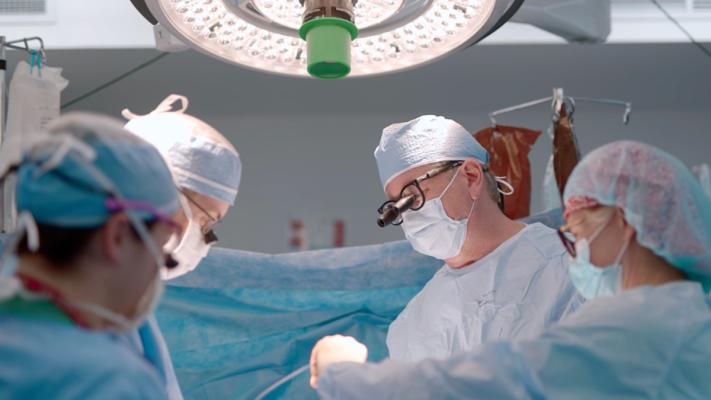
August 9, 2022 — Atrium Health Sanger Heart and Vascular Institute has hit a milestone in heart care, having performed 2,022 transcatheter aortic valve replacements (TAVR). This procedure allows the TAVR team to replace the patient’s aortic valve using a catheter-based approach instead of open-heart surgery.
Aortic stenosis, a condition that can require a TAVR procedure, occurs when calcium deposits form on the aortic valve, causing a buildup in the heart and lungs. The condition tends to affect patients over the age of 65, but it can also affect those who are middle-aged. Historically, the calcified valve was replaced using open heart surgery.
“The problem is that many elderly patients aren’t healthy enough for open-heart surgery,” said Dr. Michael Rinaldi, interventional cardiologist and medical director of the Structural Heart Program at Atrium Health Sanger Heart & Vascular Institute. “Most patients want to avoid heart surgery when they can because it's a big commitment, with a lot of risk and recovery time involved.”
TAVR has become the preferred therapy for patients with aortic stenosis, particularly for those over 70 years of age. The procedure is associated with low rates of mortality, stroke, bleeding and kidney failure. In addition, most TAVR patients can return home the next day to complete their recovery, which is much quicker compared to surgical recovery.
In addition to helping patients who do not qualify for heart surgery, TAVR can help patients who could have heart surgery, but would likely have a higher mortality rate and spend considerable time in the hospital. It’s also an alternative procedure for younger, healthier patients who are good surgical candidates, but want to return to their everyday lifestyles immediately after a valve replacement.
During the milestone procedure, the new valve was placed in a stent, which was inserted into the patient’s leg artery using a catheter. The TAVR team, which included Rinaldi and cardiovascular surgeon Dr. Eric Skipper, tracked the catheter’s pathway through the patient’s circulatory system using X-ray cameras and placed it across from the narrowed aortic valve. Once in place, the stent was expanded, propping open the new valve.
Sanger Heart & Vascular Institute has been performing TAVR procedures for the past decade. The TAVR team pioneered technology that protects a patient from having a stroke during a procedure. By filtering out small particles during the valve replacement, the team at Sanger Heart & Vascular has been able to reduce strokes by 50%, leading to better patient outcomes within 30 days of the procedure.
“Aortic stenosis touches a lot of people's lives, and TAVR can dramatically improve their survival rate,” said Rinaldi. “We've refined this therapy over time to become something that is very safe and effective.”
Dr. John Fredrick, chief of the division of cardiovascular surgery at Sanger Heart & Vascular Institute, says they have been the busiest TAVR center in the Carolinas since the valve became commercially available 10-years ago.
“That's important because a multitude of studies show that higher volumes translate to better quality and a lower risk of complications,” said Fredrick.
Because of this experience, the TAVR team was selected by Edwards Lifesciences to host a training course for providers from other regional valve replacement programs. During the course, the providers learned how to improve the efficiency of TAVR procedures.
Atrium Health Sanger Heart & Vascular Institute’s TAVR program has earned the 5-star program rating from U.S. News & World Report, making it one of only three centers to receive this designation in the Carolinas. It also received a 3-star rating, the highest possible designation from the Society of Thoracic Surgeons/ American College of Cardiology Transcatheter Valve Therapy Registry. The TAVR program is one of only a small number of programs in the U.S. to Contact: Tim Calahan 661-428-9194 [email protected] receive the highest ratings from both organizations.
For more information: https://atriumhealth.org/
Related TAVR Content:
Hospital Consolidation May Increase Access to TAVR, New Cardiac Technologies
VIDEO: How Consolidation Into Larger Health Systems Can Improve Access to TAVR
VIDEO: Cath Lab Tour at Northwestern Medicine's Central DuPage Hospital
Northwestern Medicine Mobile Stroke Unit Delivers Life-Saving Care 30 Minutes Sooner
360 View of a Cath Lab at Northwestern Medicine Central DuPage Hospital


 November 14, 2025
November 14, 2025 









